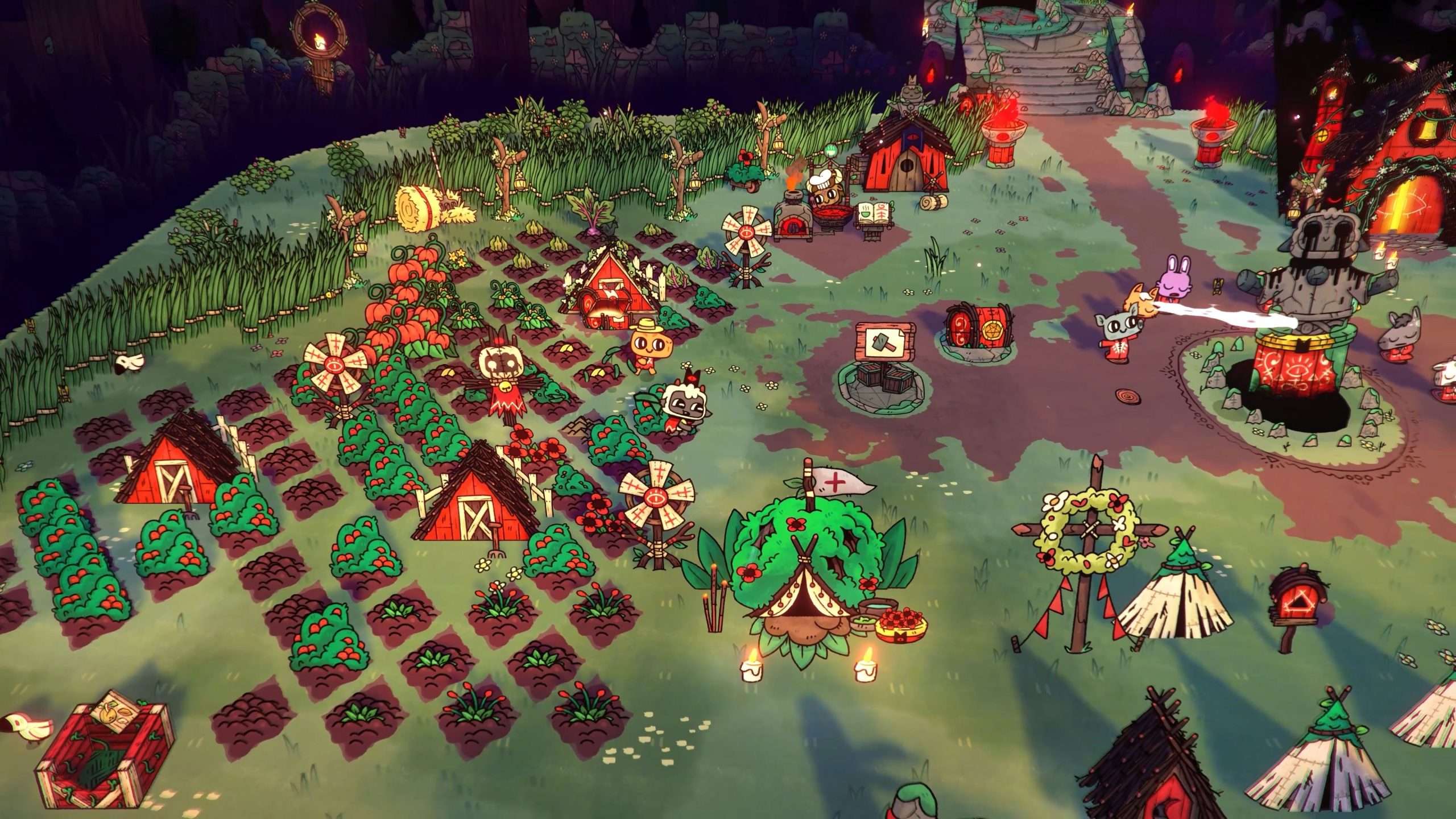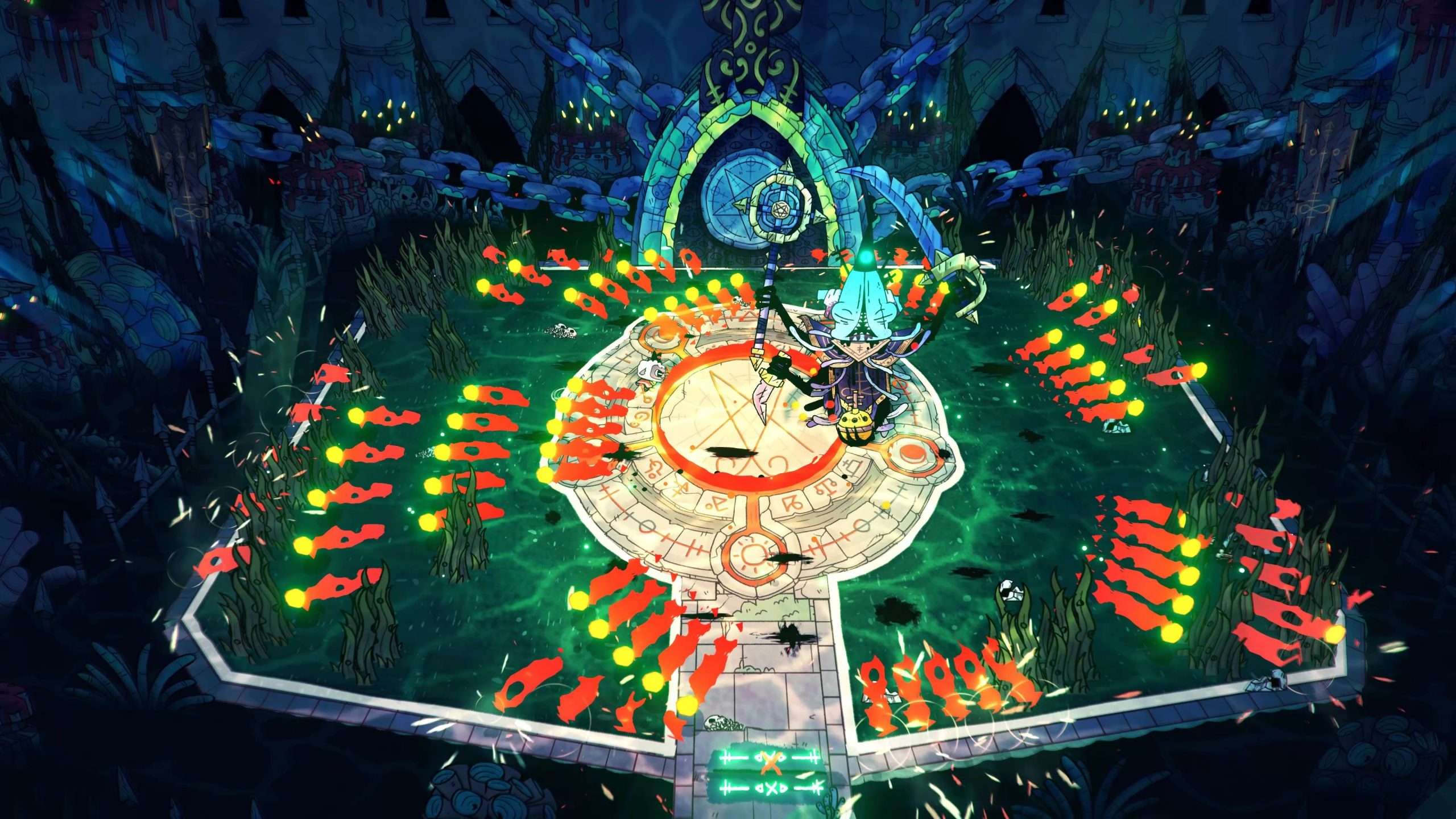
Cult of the Lamb PC Review
I enjoyed myself playing Cult of the Lamb’s demo a few months back. I said I thought it might do decently on release, but that you never know with the indie scene; even if you are published by Devolver Digital. Oh how naive I was! Apparently it went on to sell over one million copies in the first week alone. Unprecedented for a small title that didn’t go direct to Xbox’s Game Pass nor Playstation’s PS+ (although I’m not exactly sure how ‘sales’ works with those). I suppose the fantastic animated trailers, fun Twitch integrations, and Devolver’s excellent social media presence has a lot to do with the wild-fire spread of its success but even then I’m positive it shot above and beyond everyone’s hopes. But is it fated to be just a flash in the pan? An explosion of hype that quickly dies down as the next fad takes over. Or is it an instant classic? Something we may be talking about or even playing for years to come. Sadly, I believe it to be an example of the former. Though the excellent mish-mash of action roguelike ‘runs’ and a bizarrely cute-yet-satanic colony sim seems like the perfect concoction when you first dive in, it just doesn’t have the interconnectedness, challenge, nor longevity I had hoped for. That being said, it’s still a one-of-a-kind experience worth checking out if you like the look of it.
By forcing the player to balance their attempts through the game’s sixteen main levels (split into four areas of four, each of which culminate in a main boss) and spending time taking care of their cult, the title ends up lasting about twelve hours or so, depending on your skill level and need to prettify your base of course. This is just about perfect, allowing the player to encounter everything and complete the story before the repetitiveness starts to weigh it down too much. I did think that there might be some reason to keep coming back to the cult-managing side of things post-story but the side-quests and improvement trees align with the narrative rather wonderfully, freeing the player from needing to return in order to finish things off. Although for some reason it still keeps getting compared to Animal Crossing, a sentiment I greatly disagree with. The problem, I think, is mostly with expectations. When I hear ‘action roguelike/lite’, I think of games I have to work at and learn to overcome. Games that can take many, many attempts to master. And when I hear ‘colony sim’, I similarly think of titles that can last indefinitely and are often wildly expansive and complex. Cult of the Lamb is a much more streamlined, cut-down version of each of those genres strapped together.

In general that’s not a bad thing, but there are a few problems I just couldn’t get over – the first being that the hack-and-slash side of things is incredibly easy (unless you’re playing on the Switch, where the constant frame drops and crashes make it very difficult to do just about anything). This half of the gameplay is too narrow a slice of action roguelike elements, and so it loses what makes them so enjoyable and replayable. The meagre selection of weapons and per-attempt upgrades make decisions a joke – the best of each are blatantly obvious and so more often than not you end up specced out the same way. It’s possible to go against your better judgement to mix things up, but what you’ll quickly learn is that the heavier weapons and worse secondary abilities are also a total pain to use – slow and underwhelming. This often made trudging through combat kind of a bore, especially because each of the zones need clearing four times to complete. It’s grindy. And even more so if you’re interested in blinging out the colony with cool decorations, thus needing to gather extra resources.
On the other hand, whilst it starts off being quite funny to have to sweep up poop, build shelter, and feed your tribe, the need to constantly upkeep them between stages can get irritating. Not because it’s not cathartic to clean up and help your people, or because it’s not exciting to unlock and craft new buildings – it most certainly is. The irritation comes from how little there is at risk and the total lack of meaningful crossover between what you do at base and how it affects the action side of things. Every time you return from a run so much time has passed that the group’s faith is always low, mostly due to increasing hunger. Remedying the situation is a piece of cake. Make food and, if necessary, perform one of the unlocked ceremonies to keep them happy. However, this hurts both ways. Not only does it remove any urgency from handling the cult by making it effortless to sway them but even if it was harder to do, it would only become frustrating to have to waste more time on. It’s like building up a lego house and having it kicked down every time you walk out of the room. It’s not hard to put back together but it’s also not exactly interesting to do so after the first couple of times. The two halves of the game are simply too disconnected; they don’t affect one another enough and that can make them feel like work as you flit back and forth between them.

The way Cult of the Lamb smoothes this out is by affording constant upgrades, skills, side missions, new NPCs, mini-games, and more. These continuous distractions help keep the player engaged in new activities by continually filling up their to-do list and honestly it works great. There’s always a bunch to do and it keeps you well engaged, filling you with that moreish need to keep playing. It’s not until later in, when the list of tasks and unlocks finally starts to dwindle, that you notice how routine it all feels. Fetch quests, recurring requests from your followers, battling through the same enemies over and over, etc. I’m not complaining that the game isn’t huge enough or didn’t suck enough hours away, only that it rests upon the laurels of a jumble of mechanics without weaving them together in a more interesting fashion. It’s a very high level concept that doesn’t really do any one area true justice, even if it does do many things well. Personalising not only your cult and members but also your own religion via alternative ceremonies and abilities, such as choosing between hosting a feast to boost morale or having your followers fast to save on food, is a neat way to get player’s invested. My gripe is that it’s too surface level, affecting very little and without much in the way of consequences. This, combined with the simplicity of the different sections of gameplay and their abstraction from each other, seriously holds the title back. Cult of the Lamb is a good game. It’s a lot of fun. But I have this nagging sensation it could have been so, so much more interesting, and it leaves me wanting.
